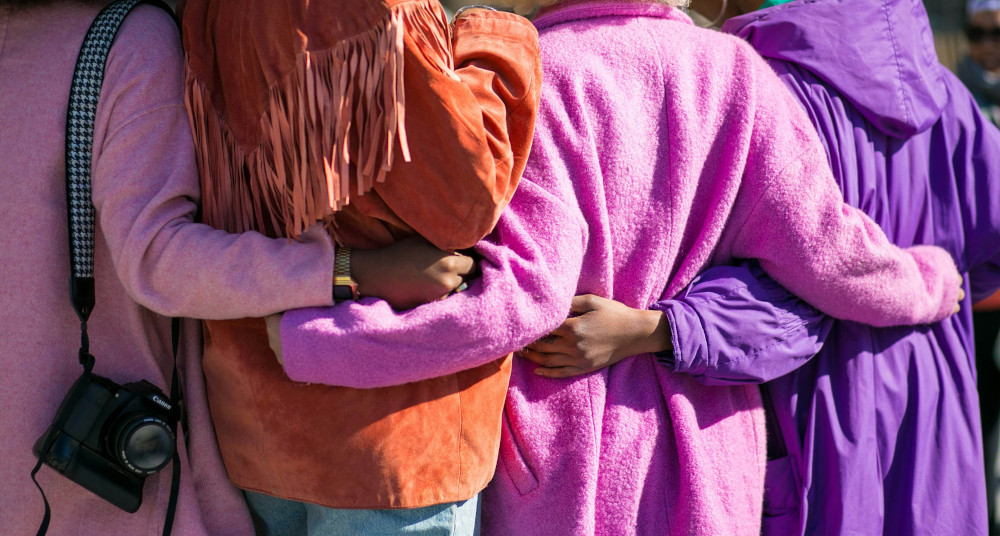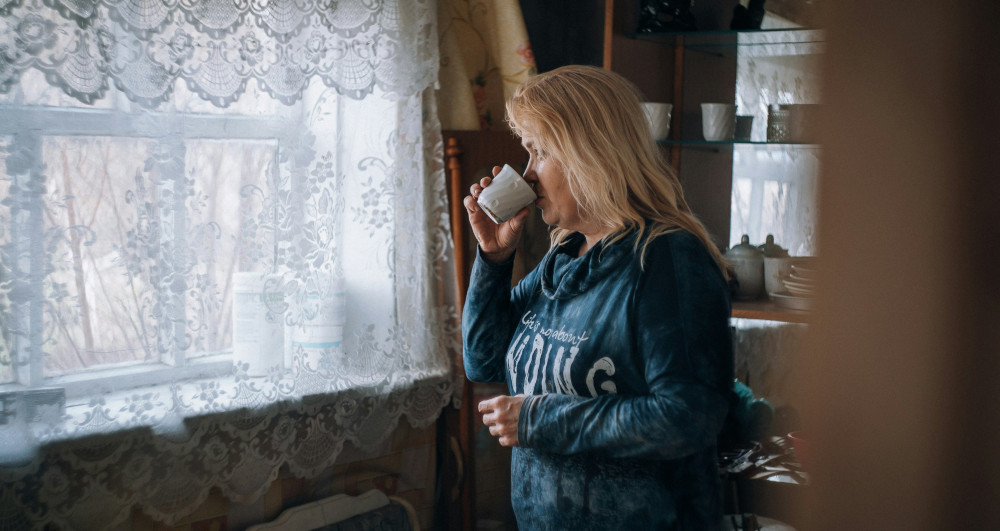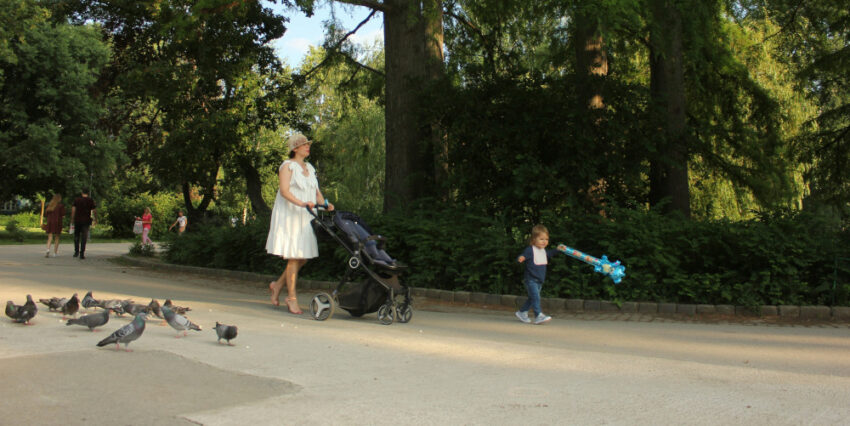The Village I Left Behind
When we moved from Mexico to Canada we knew it wouldn’t be easy leaving our support system behind, but we were very optimistic in an us-against-the-world way. But the reality is, we all come to become somewhat dependant on our family, friends and even with the familiarity of acquaintances, and when we move on from them, we are at a loss on what to do to fill in the new void.

In this post, I want to talk about navigating motherhood without support and raising kids away from family.
Why Some of Us Don’t Have Our Village
When I first moved to Canada, I had this naive idea that building a support system would be finding someone who likes the same things as you and boom, instant connection… silly me. The truth is, there are so many reasons why some of us end up navigating motherhood without that traditional village, and most of them are completely out of our control.
When Your Village is Thousands of Miles Away
For those of us who packed our lives into suitcases and crossed borders for better opportunities, our village didn’t just disappear, it’s literally on a different continent. My mom can’t drop everything to help when my daughter has a fever. My sister can’t swing by with groceries when I’m having a rough day. The friends who would have been my natural mom friends? They’re still back home, dropping me a message every few days to see how I’m managing.
And it’s not just about the physical distance. Time zones mean that when you’re having your 2 AM parenting crisis, your support system is either asleep or just starting their day. WhatsApp messages and video calls help, but they can’t hold your baby while you take a shower or want to have a date night with your husband.
Sometimes life just scatters us. Friends move away, family dynamics change, and suddenly you realize the support network you thought you had was more fragile than you imagined.
Life Transitions Reshape Everything
Something I didn’t expect was that becoming a mom doesn’t just change you, it changes your relationships too. Some friends without kids drift away, not out of malice, or because they don’t care, but because your lives suddenly look so different and it’s harder to find a common ground. Others might have kids but are in completely different phases of parenting.
Career changes can isolate us too. When I transitioned from software developer to SAHM, I lost those daily work relationships that had become a big part of my social world. Suddenly, I was home all day with a toddler, while my former colleagues were still deep in the professional world I’d stepped away from.
Invisible Barriers
Sometimes the reasons we don’t have a village are less obvious. Language barriers can make it harder to connect deeply with other parents. Cultural differences might mean your parenting approach feels isolating in your new community. Financial constraints can limit your ability to participate in activities where you might meet other families.
Mental health challenges, whether dealing with postpartum depression, anxiety, or just the overwhelm of major life changes, can make it feel impossible to reach out and build connections, even when opportunities exist.
What I’m trying to say with all this, if you are currently without a village, don’t blame yourself for your decision that lead you to this state, and don’t beat yourself up for it. There are many factors that lead us here and most if not all the time, they are not under our control.
But there’s good news. Recognizing why we’re in this situation is the first step toward doing something about it. Because while we might not have inherited a village, that doesn’t mean we can’t build one.
What It Actually Feels Like
While everyone loves to share the highlight reel of motherhood, I think we need to talk about what it actually feels like to be doing this without backup. No sugar-coating, no romanticizing, just the honest truth about the moments that test you.
The Moments When You’re the Only Adult
Picture this: It’s 2:26 AM. Your little one has a fever that came out of nowhere, and they’re crying that specific cry that makes your heart race. In that moment, you’re not just tired, you, and your partner if present, are the only decision makers. Should you call the doctor? Head to emergency? Try one more dose of medicine and wait?
There’s no grandmother to call over, no neighbour who’s raised five kids to reassure you that this is normal. It’s just you, your partner, and Google, and a gut feeling you don’t trust yet. And even when your partner is there, if you’re the primary caregiver, you know that final call usually lands on you. And if you’re truly solo parenting? My respects to you! Those middle-of-the-night decisions can feel like they weigh a thousand pounds.
The Mom Friends From Back Home
You know what I miss most about home? My friends, those who just get it without explanation. The ones who’d show up with food when you were having a rough day, who’d watch your kid for an hour while you ran errands, who’d sit with you while you cried about feeling like you were failing at everything.
So why not just build new friendships as a mom? Well, it takes time, and when you’re in survival mode with a little one, you don’t always have the emotional bandwidth to nurture new relationships. You might meet another mom at the playground who seems lovely, but getting from “nice to meet you” to “can you watch my kid while I have a breakdown” is a journey, not a quick trip.
Meanwhile, you’re watching other moms who’ve lived in the same place their whole lives, surrounded by their friends and family, and you try not to feel envious, but it does sting a little sometimes
The Guilt of Burdening Your Partner as Your Only Support
If you have a partner, there’s this weird guilt that comes with them being your only adult connection during long days. You find yourself saving up every thought, every concern, every cute thing your kid did, and then dumping it all on them the moment they walk through the door.
They become your only outlet for adult conversation, your only break from being “on” all the time, your only emotional support system. And while that’s what partnerships are for, it can feel like a lot of pressure on one person. You start wondering if you’re being too needy, if you should be more self-sufficient, if other couples have this much intensity in their dynamic.
“Am I asking for too much?”, this question lives in my head more than I’d like to admit.
Watching Other Families With Built-In Help
And then there are the moments that really test you. You’re at the park, and you see a mom chatting easily with other moms while their kids play together. Or you’re at a birthday party where everyone seems to know each other already, and you’re the new person trying to figure out where you fit.
You see families where grandparents pick up kids from school regularly, where aunts and uncles are at every birthday party, where mom friends drop everything to help each other out. And you’re genuinely happy for them, but there’s also this little voice that whispers, “Why can’t that be us?”
The hardest part isn’t the jealousy, it’s feeling like you’re somehow failing your child by not being able to provide that same network of love and support. Like you’re not enough because you’re all they’ve got.
Building Your Village, One Connection at a Time

I wish someone had told me when I first realized I needed to build my own support network, that it’s not going to look like the village you left behind, and that’s okay. Actually, it might end up being even better in some ways. But it takes time, intentionality, and a willingness to be a little vulnerable with people who start as strangers.
Starting Small: Playground Conversations and Library Story Times
I used to think I needed to find my “mom tribe” all at once, like some magical group of women would instantly become my closest friends. But real connection starts much smaller than that. It starts with the mom at the playground who makes eye contact and smiles when your kid does something ridiculous. The librarian who remembers your name and asks how your little one is doing.
These tiny interactions are like seeds. Most of them won’t grow into deep friendships, and that’s perfectly normal. But some will. The key is showing up consistently to the same places where families gather. Story time at the library, the same park on Tuesday mornings, that parent-child swimming class.
I started small. A smile here, a “how old is she?” there. Then maybe a comment about the weather or commiserating about nap time struggles. Before I knew it, I was having actual conversations with people who were becoming familiar faces. And familiar faces are the foundation of community.
Online Communities That Get Your Experience
I found incredible support in Facebook groups for immigrant moms, for women who left tech careers, for families raising bilingual kids. These spaces gave me permission to feel everything I was feeling and showed me I wasn’t the only one figuring it out as I went along.
The beautiful thing about online communities is that they’re available at 1 AM when you can’t sleep, at 6 AM when you’re the only one awake, during nap time when you need adult conversation. They’re there when you need to ask “is this normal?” or “please tell me someone else has been through this”.
But here’s the key: don’t just lurk. Engage. Comment on posts, share your own experiences, offer support to others. Community isn’t just about taking, it’s about giving too. And sometimes the act of helping another mom through something difficult ends up being exactly what you needed that day.
Reciprocal Relationships With Neighbours
I used to think I needed to become friends with people before I could ask for help. But neighbour relationships can be beautifully practical without being deeply personal. The retired couple next door who don’t mind keeping an eye on your house when you’re away. The mom down the street who can grab your mail when you’re sick. The dad who’s handy and doesn’t mind helping with small repairs in exchange for homemade cookies.
Start with small kindnesses. Bring in their packages when they’re away. Offer to pick up groceries for elderly neighbours. Let their kids play in your yard. Share garden vegetables. These small acts build trust and goodwill, and before you know it, you have people who care about your family’s wellbeing.
I learned this lesson when my daughter got sick and I realized I was out of children’s medicine. My neighbour, who I’d only spoken to a handful of times, didn’t hesitate to run to the pharmacy for me. That kind of practical support doesn’t require deep friendship, just mutual respect and willingness to help each other out.
Professional Support as Part of Your Village
Here’s something that took me a while to accept: paying for help isn’t giving up or admitting failure. It’s recognizing that some village functions can be filled by people who provide professional services, and that’s perfectly valid.
Maybe it’s a babysitter you trust for a few hours each week so you can have adult time. Maybe it’s a house cleaner once a month so you can focus your energy on family instead of scrubbing bathrooms.
The point is that village support doesn’t have to be free to be valuable. When you have the means to pay for help, it can free up your emotional energy to build other types of connections.
Becoming the Village You Wish You Had
Here’s the plot twist: while you’re building your village, you’re also becoming part of other people’s villages. That mom you offered to carpool with? You might be her lifeline. The family you invited over for dinner when they were new to the neighbourhood? You could be their first real friends in town.
Sometimes the best way to build community is to be the kind of neighbour, friend, and support person you wish you had. Host the playdate. Organize the mom’s night out. Start the neighbourhood WhatsApp group. Be the person who remembers birthdays and checks in when someone’s kid is sick.
Let’s build together, because every village needs builders, and you might be exactly the person your community needs.
Trust the Process
Building your village is like learning a new language or growing a garden: it requires patience, consistency, and faith that your efforts will eventually pay off. Some days it will feel like you’re making no progress at all. Other days, you’ll have a breakthrough that reminds you why this work matters.
Your village might look different than you imagined. It might include people you never expected. It might be spread across different areas of your life instead of being one tight knit group. And that’s not just okay, it might be exactly what you and your family need.
Little by little, connection by connection, you’re building something beautiful. Trust the process, mama. Your village is out there, and they’re looking for you too.
Taking Care of the Village Builder (You)

t’s very important to consider this: while you’re busy building connections, nurturing relationships, and creating community for your family, who’s taking care of you? You can’t pour from an empty cup, and building a village while maintaining your own wellbeing is like trying to construct a house while living in it. It’s messy, exhausting, and absolutely necessary.
Taking care of yourself isn’t selfish, it’s essential.
Micro Self-Care That Actually Works
I’m talking about five minutes of morning coffee while it’s still hot. Taking three deep breaths before responding to a tantrum. Listening to one song that makes you feel like yourself while you fold laundry. Texting a friend while your kid watches their educational show. Walking around the block with the stroller just to get fresh air and clear your head.
These tiny moments aren’t Instagram-worthy, but they’re lifelines. They’re reminders that you exist as a person beyond your role as a mother, caregiver, and village builder. Sometimes that five-minute coffee break is what stands between you and complete overwhelm.
Small moments, big difference.
Asking for Help Without Guilt
This might be the hardest skill to learn when you’re used to doing everything yourself. Asking for help feels vulnerable, especially when you’re still building trust with your new community. But here’s what I’ve learned: people generally want to help, and asking gives them permission to be part of your village.
Start small. Ask the neighbor if they can grab you milk when they’re at the store. See if another mom wants to trade babysitting for a few hours. Request that someone bring dinner when you’re having a rough week. Accept offers of help instead of automatically saying “no, I’m fine”.
The guilt around asking for help is real, especially for those of us who moved far from our families to build better lives. We feel like we should be grateful and self-sufficient, like needing help somehow negates the opportunities we’ve been given. But that’s not how community works. Interdependence isn’t weakness, it’s how humans are designed to live.
And here’s a secret: when you ask for help, you’re also giving others the gift of feeling useful and connected. You’re creating the reciprocal relationships that strong communities are built on.
Professional Support When You Need It
Sometimes taking care of yourself means recognizing when you need more support than friends and neighbours can provide. There’s no shame in seeking professional help when you’re struggling, in fact, it’s one of the smartest investments you can make in your family’s wellbeing.
Maybe it’s talking to your doctor about postpartum depression or anxiety. Maybe it’s finding a therapist who understands the immigrant experience or the challenges of major life transitions. Maybe it’s joining a support group for moms who are navigating similar situations.
Mental health support is part of the foundation that lets you build everything else. And modelling this for your kids teaches them that seeking help when you need it is normal and healthy.
A Letter to My Fellow Village-less Mamas
Dear mom
I see you there, reading this at 11 PM after finally getting your little one to sleep, or maybe during nap time with a cold cup of coffee, or perhaps while your toddler watches their third episode of the day because you just needed a moment to breathe. Wherever you are, whatever brought you here, I want you to know something: you are not alone in this, even when it feels like you absolutely are.
This Is Genuinely Hard
What you’re doing is genuinely difficult. Raising children without a traditional support system, building community from scratch, making every decision mostly on your own, this isn’t how humans were designed to parent, and it’s okay to acknowledge that it’s hard.
You’re not being dramatic when you feel overwhelmed. You’re not being ungrateful when you miss having family nearby. You’re not being weak when you wish you had more help. You’re being human, and humans need community to thrive.
I know there are days when you scroll through social media and see other families surrounded by grandparents, aunts, uncles, and longtime friends, and you wonder what’s wrong with you that you don’t have that. Let me tell you what’s wrong: absolutely nothing. Life circumstances, brave decisions, necessary moves, and sometimes just bad luck have put you in this situation. It’s not a reflection of your worth or your capabilities
You Are Stronger Than You Know
Here’s what I see when I look at mothers like us: incredible strength. Do you realize what you’re accomplishing every single day? You’re raising tiny humans while simultaneously building the community that will support them. You’re learning new systems, navigating unfamiliar territory, and creating stability for your family even when you don’t feel stable yourself.
The fact that you’re still here, still trying, still caring about doing this well. That’s not just strength, that’s heroism. You’re the mom who figures out how to handle emergencies alone, who makes birthday parties special even without extended family, who creates traditions that work for your reality. You are stronger than you think.
Every time you smile at another parent at the playground, every time you offer help to a neighbour, every time you show up for your kids even when you’re running on empty. You’re not just surviving, you’re building something beautiful. You’re creating the village that will catch your children when they fall, celebrate with them when they succeed, and show them what community looks like.
You Belong Here
To my fellow immigrant mamas: you belong in your new country. Your children belong here. The fact that you’re building community instead of having it handed to you doesn’t make you less worthy of belonging, it makes you builders, creators, women who don’t wait for permission to make a place for themselves.
Your accent, your traditions, your way of doing things. These aren’t obstacles to overcome. They’re gifts you bring to your community. The other parents at school pickup who get to know you? Their children are learning about the world through your family’s presence. You’re not just building a village, you’re making it richer, more diverse, more beautiful.
To my fellow solo parents: you are enough, and again, you have my deepest respect. Your love, your care, your dedication, it’s enough. Your children are not missing out because they don’t have an extended family nearby. They’re gaining something precious: the knowledge that they are deeply loved by someone who chose to build a whole life around caring for them.
A Final Thought
The village you’re building might not be complete yet. It might always be a work in progress, growing and changing as your family grows and changes. And that’s okay. That’s actually beautiful. Because a village that’s built with intention, with love, with the determination to create community where none existed before, that kind of village has something special.
It has heart. It has resilience. It has the kind of strength that comes from being chosen rather than just inherited.
Together we are stronger, and even when we’re not physically together, we’re connected by this shared experience of building something beautiful from nothing, of creating community through courage, of proving every day that love is enough to build a village.
You’re doing incredible work, mama. Your village is lucky to have you as its builder.
Con cariño,
Vanesa

P.S. I’d love to hear your village building stories in the comments. What’s working for you? What’s challenging? How are you creating community in your corner of the world? Let’s support each other in this journey. Because that’s what villages do.
